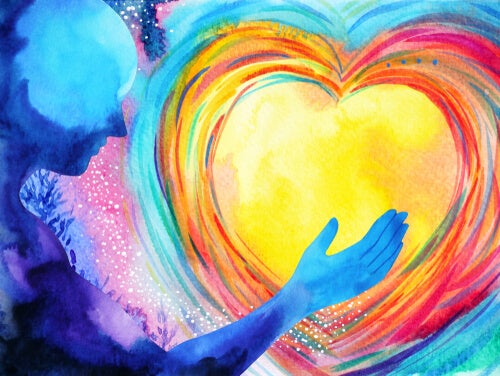The Definition of Love

What’s the definition of love? How can we define something that’s so complex, contradictory, and fascinating? Something that makes us feel so alive. It can’t be observed under a microscope although there are some who try to define it in chemical terms. Others make poetry of it.
Love means inspiration and sometimes suffering. However, everyone wants to experience it, and most have felt it at some time. Nevertheless, we still can’t explain it.
Mahatma Gandhi said that “where there is life there is love”. Without a doubt, this is one of the simplest, yet realistic and at the same time mysterious descriptions of this wonderful dimension. It nourishes the newborn baby, helps us grow, and makes us feel part of our social group. In effect, love places us in the world.

Love chooses you
Love songs. We all have our favorites. They try to explain what this feeling is and what it implies and, above all, what it produces. For example, happiness, misery, inspiration, passion… Song lyrics speak of unrequited love, and the different kinds of love. There’s romantic love, eternal love, love borne from friendship…the list goes on.
“Love is a burning thing. And it makes a fiery ring.”
-Johnny Cash-
If you’ve been or are in love, you know very well what it feels like, even if you can’t express it in an all-encompassing manner. Nevertheless, what you do know is that you’re not always free to fall in love with who you really want. To put it another way: love chooses you. However, while that choice may be the right one, it often isn’t, and that only brings you suffering.
Why do you have so little control in matters of the heart? Why can’t you be more objective and rational? What underlies the phenomenon of attraction?

The definition of love according to science
We know that there’s a certain biological component to love. Indeed, no doubt you’ve heard about that chemical storm made up of neurotransmitters such as dopamine, serotonin, and oxytocin. Nevertheless, you can’t ignore the other types of influences as well. In this case, external ones. By this, we mean our culture and the influence of our society.
According to science, when you’re in love, your brain regions related to reward and motivation are activated. These are the hippocampus, the hypothalamus, and the anterior cingulate cortex. In addition to this, oxytocin and vasopressin, produced when you fall in love, stimulate the release of dopamine and generate pleasant sensations when you see or think about your loved one.
However, this neurochemical cocktail, which makes you feel so comfortable when you’re at the start of a relationship, is also the cause of the emotional discomfort that appears after a break-up.
The definition of love from a psychological perspective
From a purely psychological point of view, love is an affective experience made up of a set of specific variables. It concerns the need to bond with someone, and the requirement of intimacy, passion, and sexuality. These principles are reflected in Sternberg’s triangular theory.
In 1986, Robert Sternberg, a professor at Yale University, proposed a psychological definition of the dynamics that build a relationship in his book, The Triangular Theory of Love. They were:
- Intimacy. These are the feelings that promote closeness, connection, and bond-building. It involves your acceptance of your partner and the feelings of trust and affection that you establish with them.
- Passion. This refers to desire, but not only the physical and sexual desire with the neurochemical components. In fact, passion is also expressed through your admiration of your partner. Via this kind of passion, the deepest affection arises, along with your need to be close to your loved one.
- Commitment. This is the express and authentic decision to build a future with your partner. It means being faithful to them, and knowing how to build a present and a future where you carry out activities together. It’s creating an ‘us’ together, a space of your own where you can consolidate your relationship.
Sternberg’s Seven Styles
These three dimensions mentioned above can form different combinations that, according to Sternberg, give rise to seven styles of affective relationship:
- Liking: Affection is usually present in these kinds of relationships. It implies intimacy without passion and with a different form of commitment.
- Infatuation. This refers to temporary and insignificant relationships. In these, there’s passion, but not intimacy or commitment.
- Empty love. This involves relationships built from interest and selfishness. In these types of relationships, there’s commitment without passion or intimacy.
- Romantic love. These are couples in which there’s a strong presence of passion and intimacy, but in which, after a while, there’s no commitment.
- Companionate love. This usually appears in very long relationships because there’s intimacy and commitment, but the passion seems to have been extinguished.
- Fatuous love. In fatuous love, there’s passion and commitment, but not intimacy. In fact, it’s possible that these partners like each other and want to be together, but don’t really have many things in common to build affinities between them.
- Consummate love: This is the love in which all three elements are combined: intimacy, passion, and commitment.
 Helen Fisher and the neurobiology of love
Helen Fisher and the neurobiology of love
Helen Fisher is a well-known anthropologist and biologist studying human behavior at Rutgers University. Her works are known around the world for presenting an alternative and interesting vision of what love is. Here’s a summary of her most important ideas and reflections:
- Love is a powerful motivational system. It’s a basic drive that allows us to satisfy a series of needs.
- The main need is to feel loved. This craving is more intense than sexuality itself. Helen Fisher explains that this vital desire of the human being constitutes what we know as romantic love. It’s about a whole series of emotional dynamics characterized by motivation, the desire to bond, the desire to share life and plans together.
- Sex drive is another one of those motivators. It’s the search for pleasure and self-satisfaction.
- Attachment. Attachment is an aspiration to obtain calm and security. It’s the development of romantic love to something more stable.
Love, prejudice, and social implications
Say you’re forty years old and still enthusiastic about the ideal of pure love. People may ridicule you and tell you that you should be more realistic. However, why should you be? It’s your own reality. Why should you deny who you are or what you feel just because of the judgments of others?
Historically there’s been a tendency to catalog how we should relate to the opposite sex. Indeed, simply by saying ‘opposite sex’, the LGTBTIQ community is being omitted or treated as taboo when it comes to talking about love.
This implies that, as a society, we’re continually making the same mistakes. In fact, we’re trying to impose the correct way of wanting and desiring. Consequently, we cut off love in all its different forms and expressions. For example, there’s a tendency to deny the fact that people with disabilities also have their emotional and sexual needs. Furthermore, the love and sexual needs of the elderly tend to be similarly ignored.
The true definition of love
Unfortunately, the media never represents the perfect couple as two lesbian women, a white boy and a black girl, or a street sweeper and a lawyer.
Loving is the greatest act of courage.
Recently, a man with multiple sclerosis appeared in the media who, lying in bed, saw his baby being born. It thrilled and excited us all, and, in reality, none of us would have ridiculed or criticized him at this life-changing moment.
We live in a culture of minimal effort and appearances. Egos are all important.
Love means dedication, but without losing your identity. Love is sharing, learning, and discovering. When you end a relationship you’re usually told that there are plenty of other fish in the sea. However, perhaps what should be added is that there are plenty of different seas. Love doesn’t understand languages, colors, ideologies, ages, or sexes. Don’t be the one who pushes it away because of your prejudices, fears, or ancient myths.
If you haven’t yet found your prince charming or you found yourself a frog, if you think that there’s no one who understands you or that you’re too complicated, you may be adopting the wrong perspective. Open your mind and live. You’ll find love in the least expected place.

What isn’t love?
As we mentioned earlier, defining love is extremely complex. This often leads you to confuse it with other feelings and expressions that definitely don’t correspond to true love. Therefore, below, we give you a list of manifestations that you should avoid in all your relationships, be it as a couple, a friendship, or a family relationship.
Emotional dependence
This occurs when one of the members of the relationship has a strong need to be in continuous contact with the other. In this way, your well-being and happiness solely depends on the presence of the other person. Also, you feel constantly afraid that the bond will end.
Jealousy
There’s a popular belief that if a partner isn’t jealous, they don’t love the other. This isn’t true. Jealousy is the product of your own insecurity, of not feeling like you’re enough for your partner. Jealousy usually generates attempts to control a partner. This ends up affecting the quality of the relationship.
Possession
It’s also common to think that the person you ‘love’ belongs to you. This generates control behaviors towards your partner as well as control over yourself. However, this is definitely not love.
Emotional blackmail
This is another way of exercising control over the other. Emotional blackmail is used to achieve a hoped-for response in a partner. Remember that love implies accepting your own freedom and that of your partner.
All cited sources were thoroughly reviewed by our team to ensure their quality, reliability, currency, and validity. The bibliography of this article was considered reliable and of academic or scientific accuracy.
- Bode, A., & Kushnick, G. (2021). Proximate and ultimate perspectives on romantic love. Frontiers in psychology, 1088.
https://www.frontiersin.org/articles/10.3389/fpsyg.2021.573123/full - García, A. (2015). El amor como problema sociológico. Acta sociológica, 66, 35-60. https://www.sciencedirect.com/science/article/pii/S0186602815000055
- Sternberg, R. J. (1986). A triangular theory of love. Psychological review, 93(2), 119-135. https://psycnet.apa.org/record/1986-21992-001
- Zeki, S. (2007). The neurobiology of love. FEBS letters, 581(14), 2575-2579. https://www.sciencedirect.com/science/article/pii/S0014579307004875
This text is provided for informational purposes only and does not replace consultation with a professional. If in doubt, consult your specialist.








